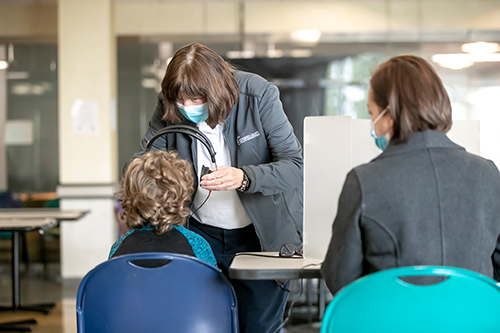Supporting the Whole Child, Whole School and Whole Community
Jump to: Healthcare Forms | Communicable Diseases | Common Health Topics | Additional Services | Awareness | Field Trips | Insurance | Awareness | Resources & Information
Healthcare Forms for Enrollment
Based on your student’s age and upcoming grade, the following should be completed by your child’s healthcare providers before enrolling and/or the start of a new school year.
Physical Exam – required for students who have never attended a Maryland Public School, including Pre-Kindergarten and Kindergarten.
Immunization Form – required for students who have never attended a Maryland Public School, including Pre-Kindergarten and Kindergarten. Proof of immunizations from a Maryland school outside of Howard County can also be used. Learn more about immunizations requirements
Dental Exam – HCPSS strongly urges families to have children visit their dentist at least once a year, please have your dentist examine your child and complete this form before registration.
Health Survey Form – parents/guardians should complete this HCPSS Health Services form
Lead Testing Form – required for enrolling a child in child care, pre-kindergarten, kindergarten or first grade.
Communicable Diseases
HCPSS families may deal with communicable diseases, such as COVID, fever, lice, etc. Infection control prevents or stops the spread of infections, and may include standard precaution methods. Learn HCPSS protocols, how these conditions are managed at school, and how they can be handled at home.
Additionally, parents/guardians should keep their children home if they are experiencing symptom(s) associated with any communicable disease. All families, students, staff and visitors should conduct daily health checks prior to entering any HCPSS building and/or school bus.
Common Health Topics
Medications
Students can take their medications, whether prescribed or over the counter, in the health room during the school day.
Learn about our medication procedures and complete a form to get medications to school →
Allergies
EpiPens must be provided by parents for use during school hours. Additionally, parents can notify the school about food allergies and accommodations can be made.
Diabetes
If a student is diabetic there are a few extra forms to fill out and the school requires a notice from a family physician.
Find out more about how your student can manage their diabetes at school →
Mental Health & Wellness
HCPSS promotes the mental health and wellness of each of our students to develop their unique strengths, abilities, and characteristics towards success and well-being.
Behavioral / Mental Health
HCPSS strives to give all students comprehensive support, with every adult serving a role in students’ social-emotional well-being. HCPSS embeds supports throughout the instructional program and embraces community and family partnerships.
Learn about behavioral and mental health and HCPSS efforts →
Substance Abuse
HCPSS strives to support students prior to disciplinary infractions involving tobacco, drugs and/or alcohol. Student services staff members are available to support and discuss with students and families.
Additional School Services
Vision and Hearing Screenings in Schools
Howard County screens students new to the Maryland school system and those in prekindergarten, kindergarten, first and eighth grades.

Telehealth at Elementary Schools
Telehealth services are currently offered at Cradlerock, Deep Run, Ducketts Lane, Hanover Hills, Phelps Luck and Talbott Springs elementary schools, and Lake Elkhorn Middle School. The program is optional, and families may decline to take part. Families are not responsible for paying a co-pay or for any amount unpaid by their health insurance company.
The telehealth program, offered in partnership with Howard County Health Department, connects a child in the health room with a health care provider in another location, allowing students to be treated in school and miss less class time.
Telehealth at Middle and High Schools
Middle and high school students have access to telehealth appointments during the school day, as outlined in Board of Education Policy 5140 – Student Participation in Telehealth Appointments and the HCPSS Telehealth Procedures Manual. Parents must provide written informed consent for student participation in telehealth appointments at school.Awareness
Sexual Health and Sexually Transmitted Infections (STI) Awareness
HCPSS and the Howard County Health Department (HCHD) have launched an awareness campaign to inform high school students about the risks of STIs and offer free, confidential screening tests and access to treatment. This initiative, “I Want the Kit” (IWTK), is co-sponsored and funded by a grant from the Maryland Department of Health (MDH).
Field Trips
Student medications and diabetic management routines are followed on all day and overnight field trips.
Paperwork for field trips is generally administered by the school, including medical procedure forms. However, to best prepare for an upcoming field trip, view the health form for extended trips.
Medications that are normally given during the school day do not need a new form filled out.
Learn more about having medications administered during field trips and how to plan for an upcoming field trip with diabetic students.
Accident and Medical Insurance
Accident Insurance
The school system does not carry medical insurance for accidents that occur at school, including non-sport related injuries, such as trips and falls, physical education injuries, and recess/playground injuries. Thus, parents are encouraged to enroll students in the accident insurance program offered through HCPSS.
Medical Insurance
The Maryland Children’s Health Insurance Program (MCHIP) is available for families, pregnant women, and children in need of medical insurance. Applications are available through the school health assistant or by contacting the Howard County Health Department at 410-313-7500.
Resources & Information
Aggregate Student Health Data Collection
As part of a Data Sharing Agreement with the Howard County Health Department (HCHD), HCPSS will collect bi-annually the program evaluation data, and share the data in the aggregate with HCHD for program evaluation purposes. Learn more about the aggregate data collected and shared with the Health Department →